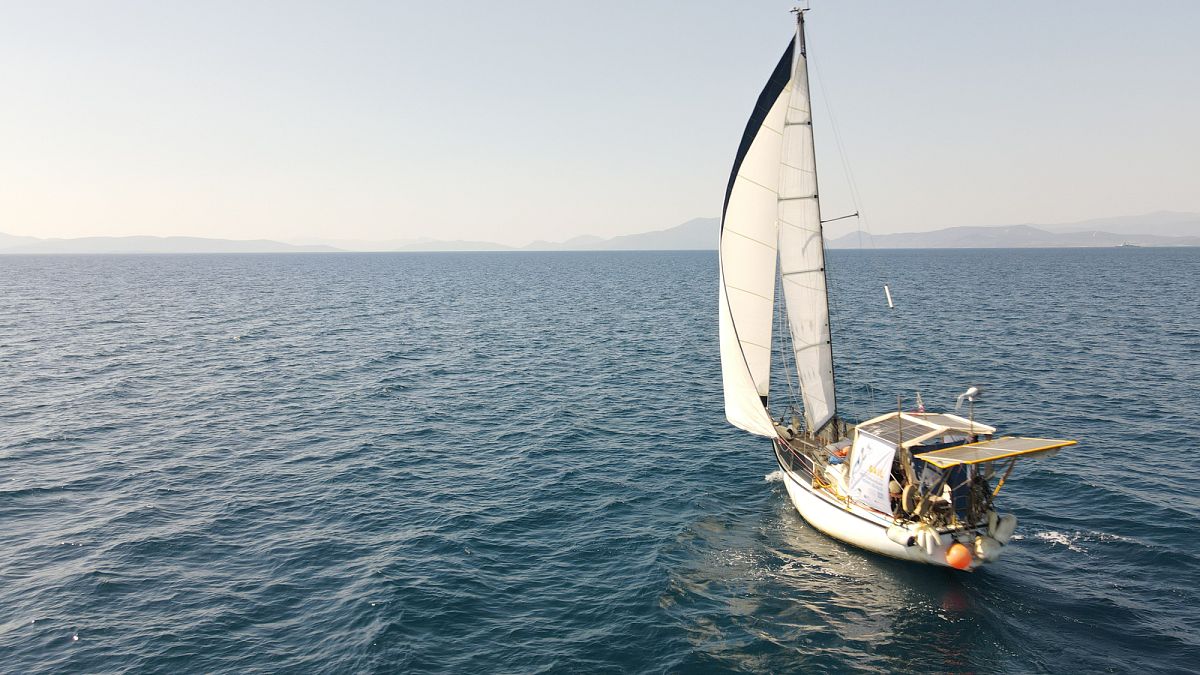Across twenty-six islands, 29 port stops and about 1000 nautical miles (185 kilometres), two low- to zero-emission sailing boats have sailed in the Aegean and Ionian Seas as part of the “Seal Greece” campaign.
The aim is to protect the Mediterranean monk seal, Monachus monachus, one of the world’s most vulnerable marine mammals. The voyage is being carried out by the Monk Seal Alliance and the Natural Environment and Climate Change Agency (OFYPEKA) of the Ministry of Environment and Energy.
In Tinos, we met the expedition covering the Aegean Sea. This is the penultimate stop on their long journey.
“On each island, the first thing I do is to set up a cube about a metre high so people can scan the QR code on the cube,” marine biologist Suzanne Raqbi tells Euronews.
“Once they do, an Augmented Reality experience starts on their phone. A beautiful seal gives them “playful” advice on how to act if they encounter Mediterranean seals.”
A ‘wake-up call’ for citizens
In addition to locals and tourists walking along the waterfront, Raqbi and Captain Loukas Gurchogiannis have been providing information to shopkeepers and business owners on the island. The aim is to get the message across to the local community, which relies heavily on tourism for its income.
The team have met some people who know nothing about the problems monk seals are facing.
“All this time, we have also met people who did not know anything about the issue, nor were they under the impression that humans can disturb and even threaten the seal,” explains Gurchogiannis.
“I think this is one of the great gains of this effort. I think it serves as a wake-up call for some citizens. They are getting information, they are thinking, and slowly, hopefully they will mobilise.”
George Kourmoutsis is one of those who knew nothing about the threats to Monachus monachus. He was born, raised and lives in New York and came to Greece on vacation. As he was walking along the waterfront of Tinos, Suzanne Raqbi asked him for two minutes of his time.
“I knew absolutely nothing, and I’m so glad that this has changed. I see so many boats around me, and I think that some people might not care about marine mammals,” 28-year-old Kourmoutsis says.
“It doesn’t mean that everyone is like that, but it’s important to have the right education and information.”
‘We harm them when we disturb them’
Recreational boats are a major source of disturbance for the Mediterranean seal. On many islands, dozens of tourist boats enter the caves that serve as a refuge for the mammals. Tourists shout, play music and try to take pictures of the seals with their mobile phones.
Even bigger problems are caused by what are known as ‘party boats’, which are cruises with very loud music, alcohol and tourists diving into the sea.
Elias Theodoropoulos is a professional skipper. He believes that there are also travellers who care about the environment.
“Tourism can be combined with environmental protection. It needs moderation and balance. I believe that this is possible. As for the clients of my boat, they showed great interest in the campaign. They scanned the QR code and were informed,” Theodoropoulos says.
“From my experience, I can say that most travellers are interested in the environment. I can’t say that they are all like that; there are also those who don’t seem to be concerned about the issue.”
There are no more than 1,000 monk seals left in the wild. Almost half of them are found in Greek waters. That is why the members of the expedition attach importance to informing and educating the public, especially young people, who in the summer even want to swim to the caves that host the seals.
The scientific community suggests some simple measures that we can all implement during the holiday season.
“We harm them when we disturb them. Often, female seals feel threatened, they are very afraid for their pups. So to avoid disturbing them, you have to stay away from them,” Raqbi tells Euronews.
“Usually, we recommend that you keep a minimum distance of about 30 metres. Also, don’t approach the caves where they hide; don’t visit them. If you are close to these caves, do not make noise and reduce the noise of the engine if you have a boat. Furthermore, reduce the volume of music. We also recommend that you choose excursions that don’t harm the environment.”
The Mediterranean seal is one of Europe’s rarest mammals. It is now also threatened by food scarcity, as the number of fish available for it to eat has suffered a dramatic decline.
These marine animals are often trapped in fishing gear, where they can be injured and/or killed. Juvenile seals – who have not learned to swim – can be fatally injured by the “ghost nets” left on the sea floor.
“Tourist activity, i.e. our holidays, can disturb and even harm marine mammals,” reports Apostolos Staikos, Euronews’ correspondent in Tinos.
“One of the aims of the Seal Greece campaign is to make people understand that the protection of the Mediterranean seal is not only the responsibility of the state and some NGOs, but also of those of us who travel to the Aegean and Ionian seas in the summer.”

